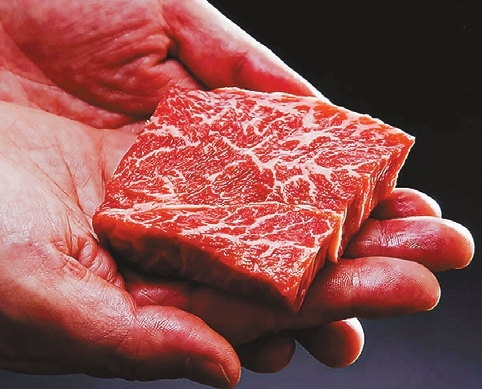
Japanese scientists just created the world’s first 3D-printed wagyu beef. Osaka University researchers used real bovine cell fibers from muscle, fat and “vessel” cells to bioprint an identical replica of traditionally farmed beef steak. Wagyu comes from one of four specific cattle breeds. It also features a distinctive fat marbling, taste and texture. Based on these criteria, the new 3D-printed beef is definitively wagyu. In a paper published in Nature Communications earlier this month, lead scientist Dong-Hee Kang explains the team’s methods and results in detail. For step one, the team harvested “multipotent” bovine satellite and stem cells from Japanese black cattle. They use these to recreate every type of cell required in the manufacture of authentic meat. The scientists then developed “tendon-gel-integrated bioprinting,” the actual building blocks of the final 3D-printed meat product. Finally, they combined and layered the individual cell fibers in such a way as to mimic the specific structure of wagyu beef. This unique process gave producers the ability to create beef with incredibly subtle variations in composition, such as fat content and texture based on health considerations and personal taste. Much like other cultured meat production, the 3D printing of proteins provides a sustainable but texturally identical alternative to traditionally farmed animal products for dedicated meat-eaters. Food production (particularly animal agriculture, and particularly beef) negatively impacts the environment. Raising animals for meat emits greenhouse gas emissions and harmful pollution. The process is also deeply inefficient and uses up excessive land, water and other increasingly finite natural resources. In contrast, cultured and 3D-printed meat presents an opportunity to produce sustainable and resource-efficient proteins that are virtually indistinguishable from conventionally farmed meat. The process is slaughter-free, and inarguably has a smaller cumulative impact on animal welfare than factory farms and industrial agriculture. “Over the past decade, cultured meat has drawn tremendous attention from the standpoints of ethics, economics, the environment, and public health,” writes Kang. “Cultured meat is highly sought after due to the possibility of imitating real meat through the manipulation of flavor, muscle/adipose cells’ ratio and texture.” This team isn’t the first to try and tackle the challenge of sustainable wagyu. Back in 2018, Eat Just began work with Japan’s Toriyama on cell-based beef, and food tech startup Orbillion Bio held an extremely successful public tasting event for its cultured wagyu back in April of this year. Plant-based versions are already available. (SD-Agencies) | 
